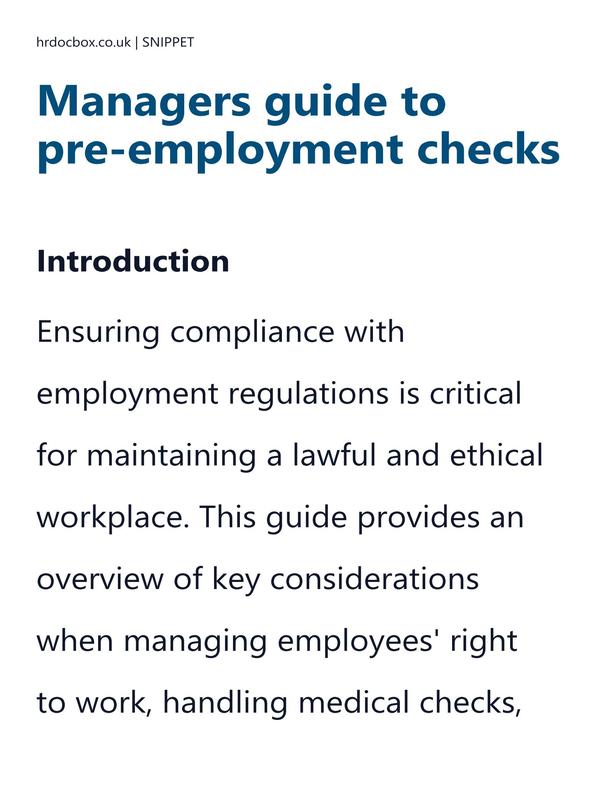Managers guide to pre-employment checks


If you have a new employee, this model guide to pre-employment checks will help you to check their integrity and background, and prevent illegal working.
- Includes Managers guide to pre-employment checks, plus 12 months’ access with all updates provided free of charge and notified to you.
- UK-specific accuracy.
- 1,317 words over 4 pages.
- Last updated 16/09/2025.
- Format: Word / PDF / plain text / email.
- Delivery: Instant download after purchase (no physical item).
- Access: Download link shown here after checkout.
- This Managers guide to pre-employment checks will SAVE you up to 2 hours research. Save cost. Reduce risk.
Managers guide to pre-employment checks
Introduction
Ensuring compliance with employment regulations is critical for maintaining a lawful and ethical workplace. This guide provides an overview of key considerations when managing employees' right to work, handling medical checks, giving references, and assessing the integrity of job candidates. Adhering to these guidelines helps employers avoid legal pitfalls and foster a fair and transparent hiring process.
1. Right to work
You must check that staff have the right to work in the UK under the Immigration, Asylum, and Nationality Act.
-
It is the employer's job to ensure that employees have the legal right to work in the UK, so don't depend on what you are told; instead, double-check.
-
When verifying an employee's permission to work in the UK, original documentation must be shown; duplicates are
This is a 10% preview of the Managers guide to pre-employment checks. For instant full access, purchase this item or a parent bundle.
Managers guide to pre-employment checks purpose
Employers are responsible for ensuring that illegal working is prevented and for building full trust in new hires.
This can be achieved by carrying out straightforward right-to-work checks before employing someone, confirming that the individual is eligible to work in the role and that their immigration status does not disqualify them. It also ensures that the information provided during the recruitment process is accurate.
This guide outlines key aspects, including:
-
Right to work
-
Medical checks
-
References
-
Candidate integrity
Compliance
Compliance
This Managers guide to pre-employment checks incorporates relevant UK laws and HR standards, including those listed below:
-
The Immigration, Asylum and Nationality Act 2006: Employers are required to conduct right to work checks on all employees before they start work to ensure that they have the legal right to work in the UK.
-
The Rehabilitation of Offenders Act 1974: Employers must take into account the Rehabilitation of Offenders Act when conducting criminal records checks on potential employees. This legislation sets out the length of time that certain convictions will remain on an individual's criminal record and when they can become spent (i.e. not disclosed) to employers.
-
The Data Protection Act 2018: Employers must comply with data protection regulations when carrying out pre-employment checks, and must ensure that they have the candidate's consent to conduct any checks and that any personal data is handled in accordance with the legislation.
-
The Equality Act 2010: Employers must ensure that any pre-employment checks are non-discriminatory and do not infringe on any protected characteristics, such as age, race, gender, or disability.
-
The Health and Safety at Work etc. Act 1974: Employers have a duty to ensure the health and safety of their employees, and may need to conduct pre-employment checks to ensure that candidates are physically and mentally capable of carrying out the required job duties.
Frequently Asked Questions about a Managers guide to pre-employment checks
Frequently Asked Questions about a Managers guide to pre-employment checks
-
Can I use the Managers guide to pre-employment checks in my small business?
Yes. The Managers guide to pre-employment checks is designed to be flexible and suitable for organisations of all sizes, including small businesses and charities. It follows UK employment law best practice, so even if you don't have an in-house HR team, you can confidently apply it.
-
Is the Managers guide to pre-employment checks compliant with 2026 UK employment law?
Absolutely. Like the Managers guide to pre-employment checks, all of our templates are drafted with the latest ACAS guidance and UK employment legislation in mind. We review and update them regularly, so you can be confident they remain compliant.
-
Can I customise the Managers guide to pre-employment checks for my organisation?
Yes, we highlight the areas of the Managers guide to pre-employment checks that you need to update with your own details, and where you need to make decisions to suit your situation. This saves you time and ensures that you meet best practice.
-
Do I get instant access to the Managers guide to pre-employment checks?
Yes. Once purchased, you'll be able to download the Managers guide to pre-employment checks instantly. Templates are provided in editable Word or Excel format so you can customise them easily, and in PDF format for easy sharing.
-
What if I need more help, not just a Managers guide to pre-employment checks?
If you're looking for broader support, we also offer toolkits and library bundles that include the Managers guide to pre-employment checks, along with other HR templates and policies for fully managing your situation. These may be more cost-effective if you need deeper advice.
-
Why should I use this Managers guide to pre-employment checks, and not AI to generate it?
The risk of using a free AI-generated template 'without review' includes your legal exposure, missing context, and no awareness of the wider process, whereas purchasing the Managers guide to pre-employment checks from us mitigates that risk.
